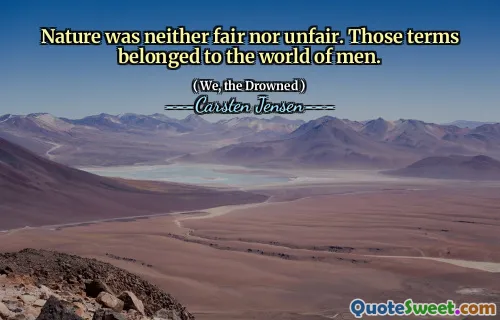
Nature was neither fair nor unfair. Those terms belonged to the world of men.
This quote reflects on the impartiality of nature, emphasizing that the natural world operates beyond human concepts of fairness and unfairness. It suggests that natural phenomena unfold according to physical laws and inherent processes, without moral judgment or bias. Human beings, however, tend to ascribe morality to nature, often interpreting events like storms, earthquakes, or droughts as either just or unjust, depending on their perspectives or circumstances. Recognizing that these concepts are human constructs can lead to a deeper understanding of our place within the natural environment. It encourages humility and acceptance, reminding us that rather than blaming nature for its unpredictability or destructive power, we should see these as inherent aspects of the natural order. Such realizations can foster a more respectful and sustainable relationship between humans and the environment, acknowledging that nature simply ‘is’—not good, not evil, but neither fair nor unfair—just indifferent to human notions. By understanding that these moral judgments are projections of human society, we can better confront the challenges and truths of our existence. This perspective also invites reflection on the ways we interpret natural events in literature, culture, and personal experience, highlighting how our moral frameworks shape our understanding of the world around us.







